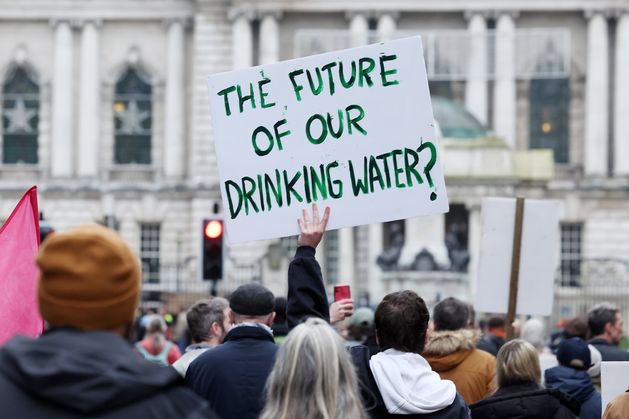Organised by the campaign group Save Lough Neagh and a number of other environmental organisations, the march comes after a number of protests over “government failures” at Lough Neagh – the body of water which supplies 40% of Northern Ireland’s drinking water.
Presently, Lough Neagh is experiencing a collapse of biodiversity and extreme eutrophication, leading to spells where it is coated in thick algal blooms with dead animals washing up along the shores.
According to campaigners, while there are a range of contributing factors to the crisis – such as agricultural pollution and invasive species – a massive source of excess nitrogen and phosphorus in the Lough Neagh catchment comes from the dumping of untreated human waste by NI Water.
NI Water has admitted that “sources from NI Water infrastructure would contribute approximately 20%” towards the overall pollution of the lough.
Statistics published by the Department for Agriculture, the Environment and Rural Affairs (DAERA) show that 24% of excess nutrients in the catchment come from wastewater and sewage discharges, which serves to feed the cyanobacteria causing the widespread algal blooms.
Pádraig Cairns from Save Lough Neagh said that, while the preservation of one of Europe’s largest freshwater lakes is their priority, they are also “gravely concerned” about the contamination of drinking water.
“Residents around the shores have been reporting discoloured, foul tasting water for months. Serious questions need to be asked of both NI Water and Stormont for allowing this situation to escalate into a public health emergency,” he said.
“With parts of our sewer network dating back centuries, and new housing developments currently being stalled due to lack of sewage infrastructure, the clear solution is a significant and long-overdue investment in modernising our sewers.”
The campaigner is calling for NI Water to be brought into public ownership and “run at cost” so that “working people will not foot the bill for decades of government failings”.
“We will not bail Stormont out by paying water charges,” he said.
“While our society is mired in a ‘cost of living crisis’, the last thing people need is to pay for access to what should be a human right – clean water.”
An NI Water spokesperson said: “From the outset, we would like to assure our customers that NI Water’s number one priority is and always will be the quality and safety of the public’s drinking water supply.
“We can further assure you that the water supplied from all our works, which includes water abstracted from Lough Neagh, remains safe to drink. We have a robust testing and sampling system which operates 365 days a year to ensure the safety of drinking water.
“It is important to note that there are many factors contributing to pollution issues within Lough Neagh. Farming and agricultural is the main source of pollution, contributing to more than 60%. Sources from NI Water infrastructure would contribute approximately 20%.
“It is clear that improving the water quality within Lough Neagh requires a multi-agency approach which DAERA is heading up.”
DAERA has been contacted for comment.

